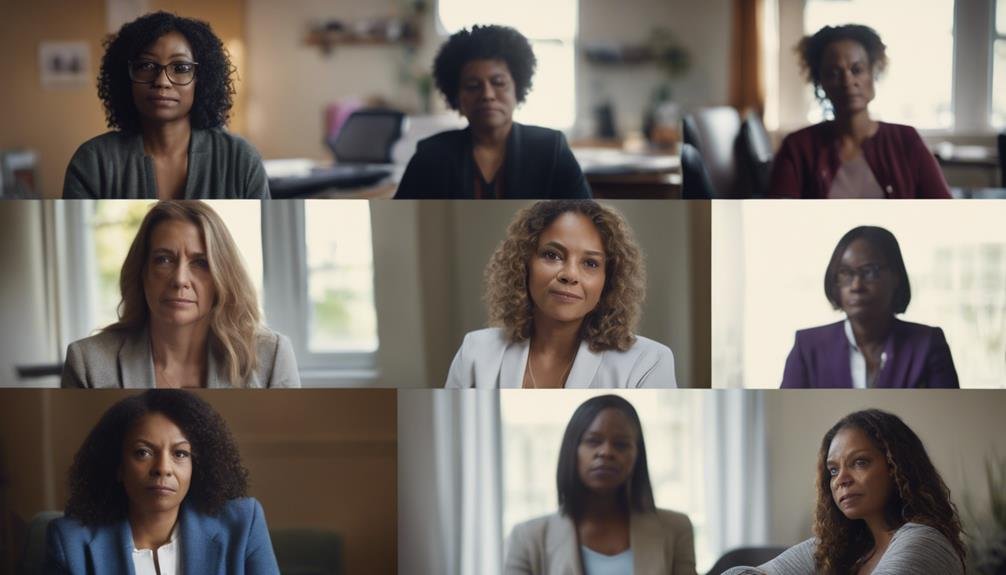Stay updated on the latest accredited domestic abuse law reforms. Learn about statutory definitions, survivor safeguards, protective measures like DAPNs and DAPOs, and automatic eligibility for special measures. Explore the statutory support schemes and enhanced protections for victims, as well as the essential support services and collaborative efforts among agencies. Keep yourself informed to understand the evolving landscape of domestic abuse legislation.
Key Takeaways
- Statutory Definition of Domestic Abuse for clear identification and legal action.
- Introduction of DAPNs and DAPOs for immediate and long-term protection.
- Prohibition of Offender Cross-Examination safeguards survivors’ rights.
- Enhanced Protection for Victims through Domestic Abuse Act measures.
- Vital Support Services with increased funding and improved access to resources.
Statutory Definition of Domestic Abuse
The statutory definition of domestic abuse plays an essential role in identifying and addressing abusive behavior within the legal system. In the context of domestic law, having a clear definition of what constitutes domestic abuse is pivotal for recognizing and intervening in potentially harmful situations.
By outlining specific behaviors that qualify as abusive, the statutory definition provides a framework for legal authorities to take action and protect victims.
This legal clarity enables law enforcement, courts, and support services to effectively respond to instances of domestic abuse. It helps in distinguishing between normal disagreements and harmful behavior, ensuring that victims receive the necessary assistance and perpetrators are held accountable for their actions.
Understanding the statutory definition of domestic abuse is fundamental for both preventing further harm and providing support to those affected by abusive relationships. By defining the parameters of domestic abuse, the legal system can better serve individuals in need of protection and intervention.
Prohibition of Offender Cross-Examination
When exploring the prohibition of offender cross-examination in domestic abuse cases, it’s essential to highlight the significant impact this measure has on protecting survivors’ rights.
By limiting cross-examination, the legal system safeguards fair court proceedings and shields victims from further trauma or intimidation.
This prohibition plays a crucial role in creating a safe and supportive environment for survivors to share their experiences and seek justice.
Cross-Examination Limitations
Implementing limitations on cross-examination by offenders in domestic abuse cases greatly enhances the protection of victims during legal proceedings. By prohibiting offender cross-examination, domestic abuse survivors are shielded from potential retraumatization and intimidation in court. This restriction guarantees a more secure and supportive environment for victims to share their experiences without the fear of facing their abusers directly.
The legal prohibition of offender cross-examination serves as a critical measure to safeguard the emotional well-being and safety of domestic abuse survivors during testimony. Victims can now testify without the added stress of facing their perpetrators in court, allowing them to seek justice without being subjected to further harm.
This legal enhancement underscores the commitment of the justice system to prioritize the protection and support of victims, empowering survivors to navigate legal proceedings with increased confidence and security.
Protecting Survivors’ Rights
By prohibiting direct cross-examination by offenders in domestic abuse cases, survivors’ rights are safeguarded, ensuring a more secure legal environment for victims. This prohibition of offender cross-examination in domestic abuse cases is an essential step in enhancing domestic abuse protection. It prevents perpetrators from directly questioning survivors, reducing the risk of further trauma and intimidation during legal proceedings.
Instead of facing their abusers in court, survivors can now testify without fear of direct confrontation. Offenders are required to utilize legal representatives or other approved methods to cross-examine witnesses, maintaining a safer and more supportive environment for survivors seeking justice. This reform not only upholds survivors’ rights but also enables them to participate in legal proceedings without the distress of retraumatization.
Ensuring Fair Court Proceedings
The prohibition of offender cross-examination in domestic abuse cases significantly improves the fairness and protection of survivors within court proceedings. This critical reform in criminal justice prevents perpetrators from directly interrogating victims, thereby safeguarding victims of abuse from further trauma.
By disallowing offenders to cross-examine victims in person, the legal system creates a more supportive and secure environment for vulnerable individuals during court proceedings. This measure is specifically designed to prioritize the safety and well-being of domestic abuse survivors, recognizing the need to shield them from potential intimidation or emotional distress caused by facing their abusers in court.
Ultimately, the prohibition of offender cross-examination aims to promote a more equitable and just process for victims of abuse within the criminal justice system, offering them a greater sense of security and protection as they seek justice and redress.
Introduction of DAPNs and DAPOs

You’ll explore the practical application of DAPNs in protecting domestic abuse victims and preventing immediate harm.
Additionally, the significance and implications of DAPOs in imposing long-term restrictions on perpetrators will be examined.
These measures play a vital role in safeguarding victims and ensuring accountability for offenders within the framework of domestic abuse law reforms.
DAPNs in Action
Introducing DAPNs and DAPOs has greatly strengthened the legal arsenal against domestic abuse, offering swift and lasting protection to victims.
DAPNs, or Domestic Abuse Protection Notices, play an important role in criminal law by providing immediate safeguards through the prohibition of contact between the perpetrator and victim.
On the other hand, DAPOs, known as Domestic Abuse Protection Orders, extend this protection with longer-term restrictions on the offender’s behavior.
Noteworthy, victims automatically qualify for special measures in criminal courts upon the issuance of either a DAPN or DAPO, ensuring their safety and well-being during legal proceedings.
By introducing these measures, the legal framework for combating domestic abuse has been significantly enhanced, enabling quicker responses to incidents and ultimately improving victim safety.
The implementation of DAPNs and DAPOs showcases a proactive approach in addressing domestic abuse and underscores a commitment to prioritizing the protection of vulnerable individuals.
Effectiveness of DAPOs
An essential aspect to take into account when evaluating the effectiveness of DAPOs is their immediate impact on providing safety to domestic abuse victims. DAPOs, introduced in the UK in 2021, serve as a vital tool in protecting individuals from further harm. These court orders carry the power to prohibit abusers from contacting or approaching their victims, thereby creating a safer environment.
Additionally, the implementation of DAPNs as emergency measures before obtaining a DAPO showcases a proactive approach in safeguarding victims. It’s important to note that violating a DAPO is considered a criminal offense, with penalties that may include imprisonment or fines.
Automatic Eligibility for Special Measures
In the domain of domestic abuse law reforms, the provision of automatic eligibility for special measures stands as a pivotal advancement in safeguarding victims’ well-being during criminal court proceedings.
Victims of domestic abuse are now automatically entitled to special measures such as screens, video links, or intermediaries in the criminal justice system without having to request them. This proactive approach aims to reduce the trauma and stress experienced by victims when engaging with the legal process.
By ensuring immediate access to special measures, the system empowers victims and provides essential support throughout court proceedings. This change acknowledges the vulnerabilities of domestic abuse victims and prioritizes their safety and comfort during what can be a challenging and emotionally taxing experience.
Automatic eligibility for special measures represents a significant step forward in creating a more supportive and victim-centered approach within the criminal justice system.
Statutory Basis for DV Disclosure Scheme

The statutory foundation underpinning the Domestic Violence Disclosure Scheme (DVDS) establishes a legal framework for disclosing pertinent information regarding a partner’s history of domestic violence. This statutory basis enables individuals to request details about a partner’s violent past, aiding in making informed decisions to protect potential victims.
The DVDS statutory framework aims to prevent harm by providing a structured process through which relevant information can be shared among agencies. By allowing for the disclosure of information related to domestic violence, the legal framework of the DVDS works towards safeguarding at-risk individuals and enhancing overall protection measures.
This statutory support guarantees that agencies can collaborate effectively to share critical information, ultimately working towards the prevention of domestic violence and the promotion of a safer environment for all individuals involved. Through this legal structure, the DVDS serves as an essential tool in addressing and mitigating the risks associated with domestic violence.
Enhanced Protection for Victims
With the implementation of the Domestic Abuse Act, victims of domestic abuse now benefit from enhanced protective measures and legal provisions.
The Act introduces new measures such as Domestic Abuse Protection Notices (DAPNs) and Orders (DAPOs), providing victims with quicker access to protection.
Additionally, victims now have automatic eligibility for special measures in criminal courts, safeguarding their well-being during legal proceedings.
Importantly, the Act prohibits offenders from directly cross-examining victims in person, reducing further trauma for those affected by domestic abuse.
Additionally, the establishment of a statutory definition of domestic abuse strengthens legal frameworks, ensuring a clear understanding and recognition of abusive behaviors.
Funding increases for domestic abuse services further enhance victim protection by providing extensive support and resources.
These advancements signify a significant step towards prioritizing the safety and well-being of victims within the legal system, offering them the necessary assistance and protection they deserve.
Vital Support Services

Enhanced funding for domestic abuse services has greatly strengthened essential support for victims in need. This increased financial backing has allowed for the expansion of important services aimed at aiding victims of domestic abuse.
Access to legal advice and resources has been notably improved, ensuring that victims receive the necessary assistance to navigate the complexities of the legal system. Moreover, the removal of barriers to legal aid means tests has played a pivotal role in enhancing access to justice for individuals impacted by domestic abuse.
These developments reflect a proactive response to the pressing needs of victims and signify a positive shift towards a more supportive and empowering environment for those affected by domestic abuse.
Collaboration Among Agencies
Effective responses to domestic abuse cases rely heavily on collaborative efforts among various agencies involved in victim support and intervention. In cases of violence against women, the cooperation between law enforcement, social services, and advocacy groups plays a pivotal role in providing thorough assistance to victims.
By sharing information and resources, these agencies can offer more tailored and effective support, ensuring a holistic approach to addressing domestic abuse. Multi-agency collaborations not only streamline processes but also enable a more coordinated response, ultimately leading to enhanced protection for victims.
Improved communication and cooperation among agencies facilitate quicker and more efficient interventions in domestic abuse situations, increasing the likelihood of safeguarding individuals from further harm. Hence, fostering strong partnerships and communication channels among different entities involved in combating domestic abuse is essential in ensuring that victims receive the necessary support and protection they urgently require.
Frequently Asked Questions
What Is the New VAWA Bill?
The new VAWA bill, reauthorized in 2022, impacts your state through funding allocation based on its guidelines. This impacts support services for victims of domestic violence, including children, ensuring safer communities for all.
What Is the Kayden’s Law in Ct?
If you’re wondering about Kayden’s Law in CT, it enhances protection orders in cases of Domestic Abuse, addressing coercive control tactics. It also impacts child custody issues, aiming to offer better safeguards for victims.
What Is the Final Rule of Vawa?
The Final Rule of VAWA, pertaining to domestic abuse, establishes guidelines for VAWA-funded programs. It guarantees compliance with VAWA standards, covering reporting, data collection, confidentiality, and service provision. Grant recipients must adhere to these requirements for effective funding use.
What Does the VAWA Act Do?
The VAWA Act aims to uplift individuals facing challenging circumstances by providing essential support services and legal protections. It aims to enhance collaboration among key stakeholders to improve responses to domestic abuse situations.
Conclusion
To sum up, the ongoing reforms in domestic abuse laws are vital steps towards providing better protection and support for victims.
By implementing statutory definitions, prohibiting offender cross-examination, and introducing new protective orders, the legal system is making significant progress in addressing this serious issue.
It’s imperative for all agencies and support services to continue collaborating and working together to guarantee the safety and well-being of those affected by domestic abuse.







